Episode 23: Emergent Strategies to Support Cultures of Repair and Care
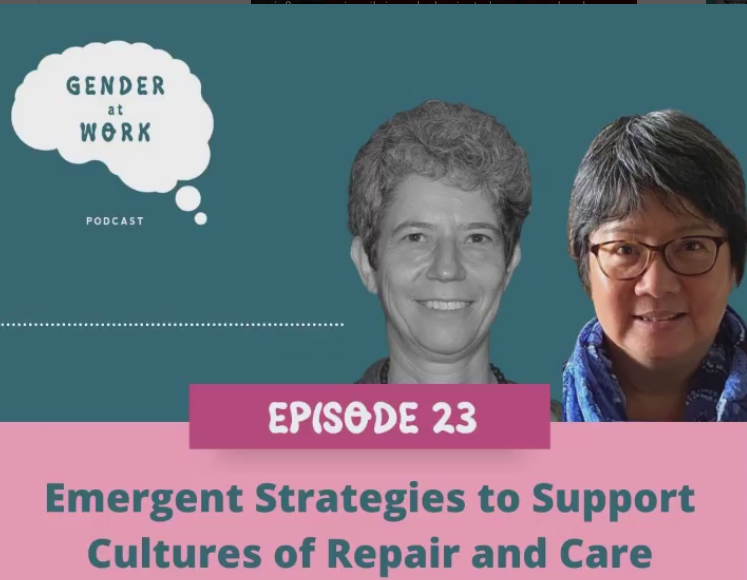
How do feminist organizations get beyond ‘calling out’ to repair and care? What can we learn from feminist leaders who are experimenting with strategies to build trust, reverse practices that undermine feminist collective action, and prioritize care, connection and thriving?
Introducing madeleine kennedy-macfoy
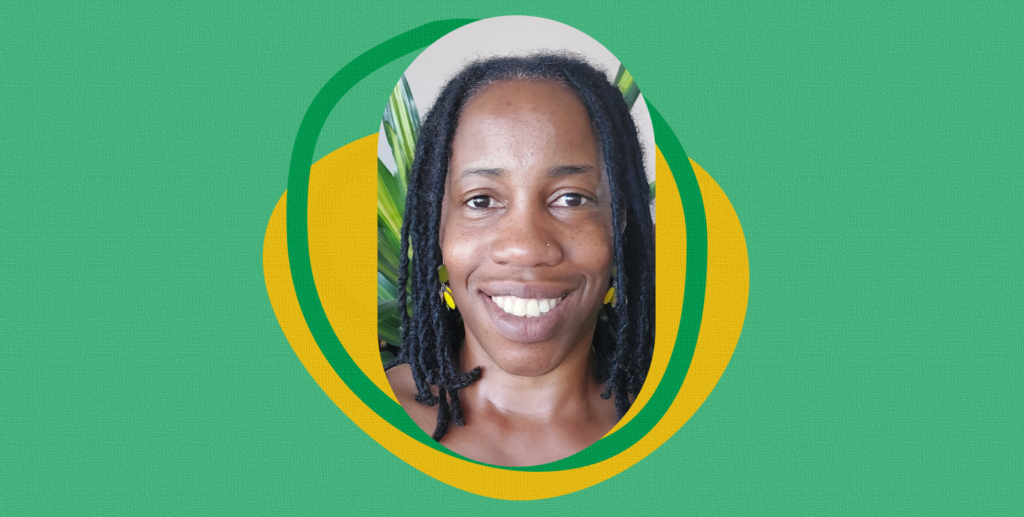
The same day in March that the World Health Organisation (WHO) declared the COVID-19 outbreak as a global pandemic, my Gender at Work colleagues and I were in a meeting room in Hyderabad. Oblivious to this fact, we were diligently planning for what promised to be a busy year for the next phase of the Project funded by Oak Foundation. After successfully executing phase 1 of the project, our first larger collective planning session for the second phase was scheduled for April 2020. We drafted a broad agenda to be finalized after our discussion with Civil Society Academy (CSA), co-grantee in this project. Needless to say, things did not go as we had planned.
Episode 22: Feminist Reckonings or Feminist Wrecking Balls?
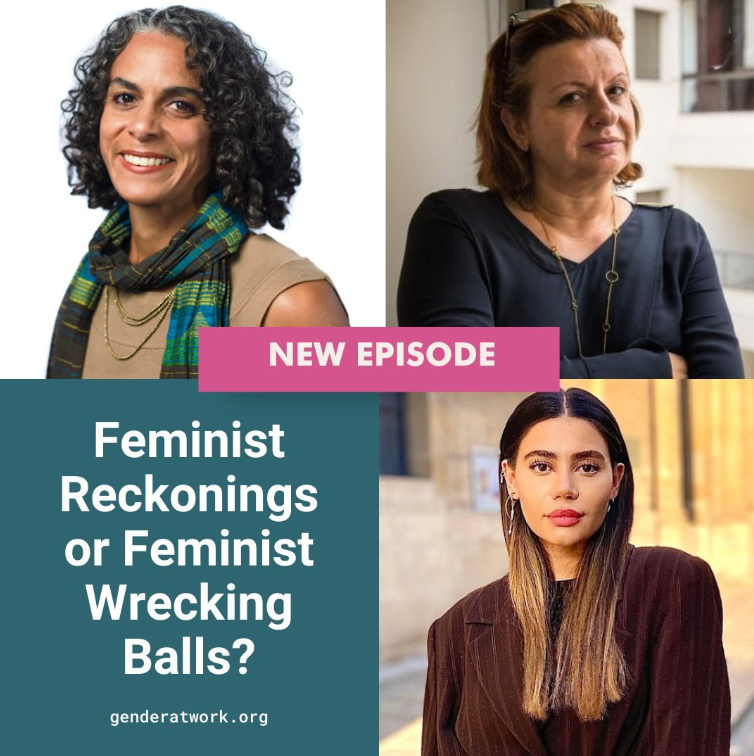
What is driving the growing numbers of implosions that many social justice groups around the world – including feminist organizations and networks — are experiencing? Coming on the heels of the #MeToo movement, the flashmobs inspired by the “El Violador Eres Tu!” movement, and the Black Lives Matter protests following the murder of George Floyd, we started to witness staff in feminist organizations publicly calling out abuse of power, racism, gender discrimination and other forms of exclusionary practices in the very organizations that we joined to reverse these.
Reflections on the Transgender Day of Visibility

The same day in March that the World Health Organisation (WHO) declared the COVID-19 outbreak as a global pandemic, my Gender at Work colleagues and I were in a meeting room in Hyderabad. Oblivious to this fact, we were diligently planning for what promised to be a busy year for the next phase of the Project funded by Oak Foundation. After successfully executing phase 1 of the project, our first larger collective planning session for the second phase was scheduled for April 2020. We drafted a broad agenda to be finalized after our discussion with Civil Society Academy (CSA), co-grantee in this project. Needless to say, things did not go as we had planned.
Episode 21: Are Feminist Leadership Transitions Feminist?
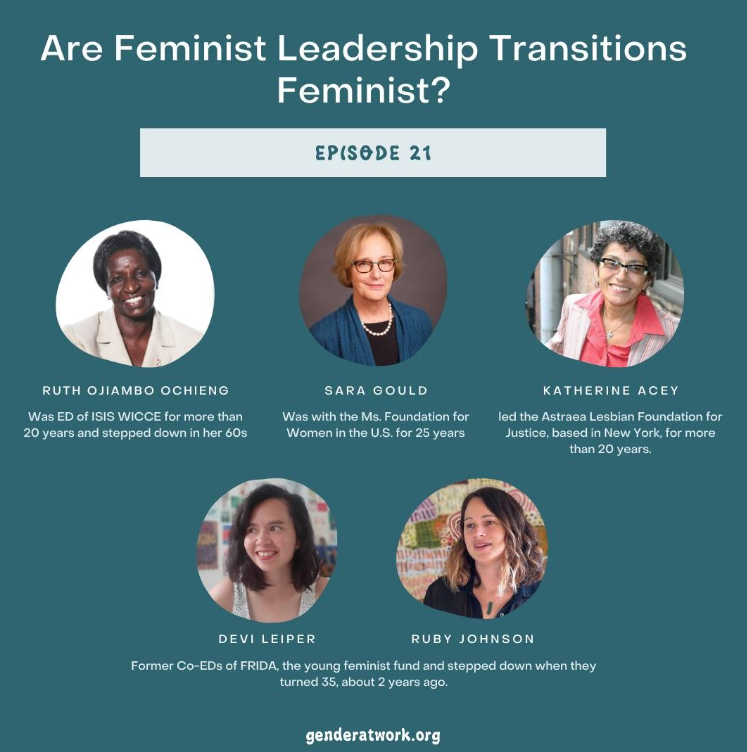
We just completed the seminal month for women’s rights globally – worldwide celebration of International Women’s Day on March 8th, innumerable events worldwide for Women’s History month in the United States, and the 66th UN Commission on the Status of Women (CSW) recently concluded. Women’s rights and feminist organizations and movements are the drivers of change for gender equality yet, the question of how feminist organizations grow and thrive, the tensions they experience between principles and how those get practiced, and around how power is exercised are really topics at events like the CSW. In our last episode, we interviewed three founder leaders of feminist organizations and for this episode, we talked with a group of fierce feminist leaders who invested their hearts and souls in four very different organizational contexts over the past 30 years.
Episode 20: Feminist Leadership Transitions
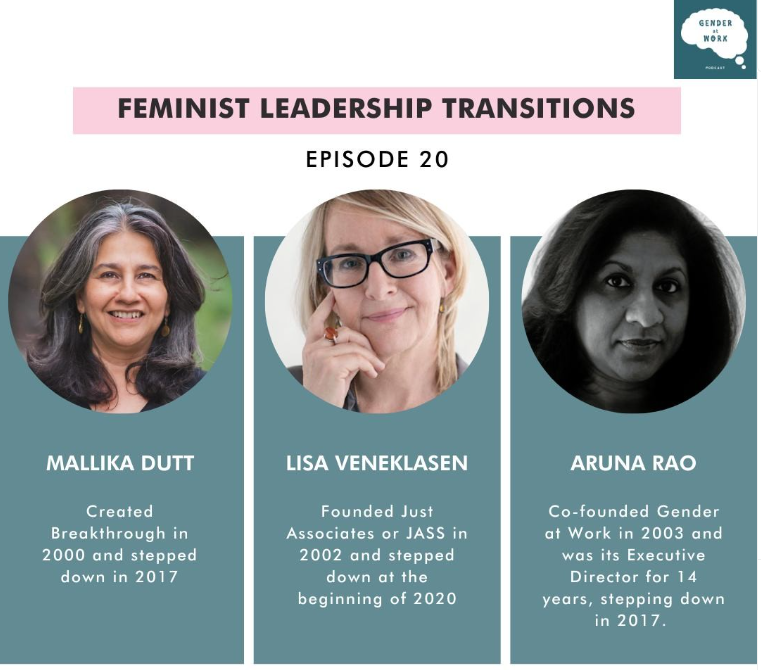
In our last episode we talked about the challenges of dismantling patriarchy and promised that our next episode would start to unpack different strategies to topple patriarchy. We have chosen to focus first on how leadership transitions happen and what happens to the leaders who choose to leave. There is a generational shift in leadership of feminist organizations around the world and we can see that these shifts happen differently in different contexts. They represent a way in which we both wrestle with and challenge patriarchy.
Feminists Leading Change: Women in Leadership Roles
Despite some progress in the workplace in the last few years, gender stereotypes are still entrenched in our societies and workplaces. Gender norms, stereotypes and socio-cultural practises can still be very restrictive for women’s participation in the workplace. Currently, women make up less than 10% of executive directorships in FTSE100 companies. Research shows that for women to aspire to rise to leadership positions, role models are vital.
Feminists Leading Change: Renata Avila
Meet Renata Avila, a feminist reimagining Artificial Intelligence to include us all. Expert in digital rights, she studies the politics of data, the evolution of transparency, and their implications on trade, democracy and society, alerting about a phenomenon she describes as digital colonialism. She is a Guatemalan, International Human Rights Lawyer and author. She is currently an HAI Race & Tech Fellow at Stanford University. With more than fifteen years of experience working in cutting edge issues related to technology and society. She co-founded and leads the
Feminists Leading Change: Nitika Pant
Meet Nitika Pant. A woman challenging gender norms and leading those in her community with her, in her revolution. Nitika Pant is a co-founder of SAKAR, India, which was established in 2005. Nitika and her organisation promote gender equality and minority rights. She is especially concerned about the health and education of adolescent girls in Bareilly, India, where she lives.
Feminists Leading Change: Kelsie Joseph
Meet Kelsie Joseph, a young feminist activist leading the change in addressing gender-based violence (GBV) in Trinidad and Tobago. GBV is at its heights in Trinidad and Tobago and young women are demanding their government to prioritize their safety. Kelsie is on the front lines in protests and demanding action. Kelsie is part of the leadership team of the global youth movement: Chalk Back. She is the co-founder of catcallsofUWI (University of West Indies).
